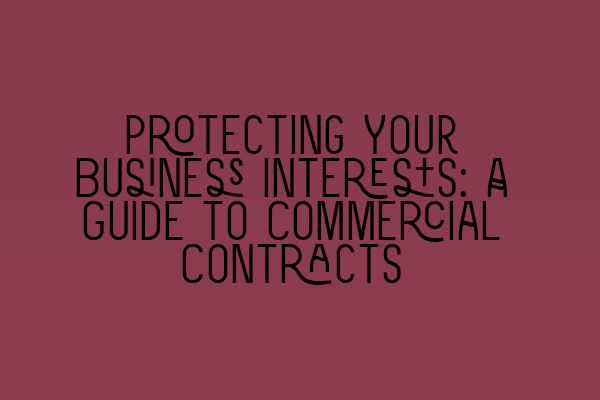Protecting Your Business Interests: A Guide to Commercial Contracts
Welcome to SQE Contract Law, where we are dedicated to helping you protect your business interests through robust and legally binding commercial contracts. In today’s fast-paced and rapidly evolving business landscape, it is crucial for entrepreneurs and business owners to understand the importance of sound contractual agreements. In this comprehensive guide, we will discuss the key considerations, best practices, and legal principles involved in creating and enforcing commercial contracts.
1. Understanding Commercial Contracts
A commercial contract is a legally binding agreement between two or more parties that outlines the terms and conditions governing their business relationship. These contracts play a vital role in protecting the interests of all involved parties and minimizing the risks associated with business transactions. Whether you are entering into a partnership agreement, a sale of goods contract, or a service agreement, careful attention must be paid to key legal elements.
2. Essential Elements of a Commercial Contract
When drafting a commercial contract, certain essential elements must be included to ensure its validity and enforceability:
- Offer and Acceptance: The contract must clearly state the offer made by one party and the acceptance of that offer by the other party.
- Consideration: There must be a mutual exchange of something valuable (e.g., money, goods, services) between the parties involved.
- Intention to Create Legal Relations: The parties must intend for the contract to be legally binding, and this intention should be explicitly stated.
- Legal Capacity: The parties entering into the contract must have the legal capacity to do so (i.e., they must be of legal age and sound mind).
- Clear Terms and Conditions: The contract should outline the rights, obligations, and responsibilities of each party in a clear and unambiguous manner.
- Lawful Object: The contract must have a lawful purpose and cannot involve any illegal activities.
Additionally, it is essential to consider the inclusion of clauses related to dispute resolution, termination, intellectual property rights, confidentiality, and limitation of liability, among others. Consulting with a qualified solicitor can help you identify any industry-specific requirements and tailor your contract accordingly.
3. Ensuring Enforceability
For a commercial contract to be enforceable, it is vital to adhere to certain legal principles:
- Proper Form: Most commercial contracts do not require a specific form; however, certain agreements, such as those involving real estate or long-term leases, may require written form to be enforceable.
- Mutual Consent: All parties must voluntarily and willingly agree to the terms and conditions of the contract.
- Absence of Unconscionability: The terms of the contract must be fair and reasonable for all involved parties.
- Absence of Fraud or Misrepresentation: Contracts entered into as a result of fraud or misrepresentation are typically not enforceable.
- Compliance with Legal Requirements: The contract must comply with all relevant laws and regulations, including those related to consumer protection, competition, and data privacy.
By adhering to these principles and ensuring the presence of all essential elements, you can significantly enhance the enforceability of your commercial contracts and safeguard your business interests.
4. Common Pitfalls to Avoid
While drafting and negotiating commercial contracts, it is important to be mindful of certain common pitfalls to avoid potential legal disputes:
- Ambiguity: Ambiguous provisions can give rise to disagreements and conflicts. Ensure that the language used in your contract is clear, precise, and leaves no room for interpretation.
- Lack of Consideration: Failing to establish a mutual exchange of value can render the contract unenforceable. Ensure that both parties receive something of value in exchange for their obligations.
- Failure to Update: As your business evolves, your contracts must adapt to reflect new circumstances and legal requirements. Regularly review and update your agreements to ensure their ongoing relevance and effectiveness.
- Lack of Legal Advice: Consulting with a qualified solicitor who specializes in contract law is essential to minimize risks and ensure compliance with legal requirements. They can provide valuable insights and guidance throughout the contract drafting process.
Remember, prevention is always better than cure. Taking the time to create well-drafted and comprehensive commercial contracts can save you from costly legal battles in the future.
5. Get Professional Legal Assistance
At SQE Contract Law, we understand the importance of protecting your business interests through watertight commercial contracts. Our team of experienced solicitors is dedicated to providing expert legal advice and assistance throughout the contract drafting and negotiation process.
If you require professional guidance or have any legal concerns regarding your commercial contracts, we invite you to contact us for a consultation. Our team will work closely with you to understand your specific needs and objectives, ensuring that your contracts protect your business interests and comply with all applicable legal requirements.
Continue your learning journey with our related articles:
- SQE 1 Practice Exam Questions
- SQE 1 Practice Mocks FLK1 FLK2
- SQE 2 Preparation Courses
- SQE 1 Preparation Courses
- SRA SQE Exam Dates
Protect your business interests today with SQE Contract Law!
